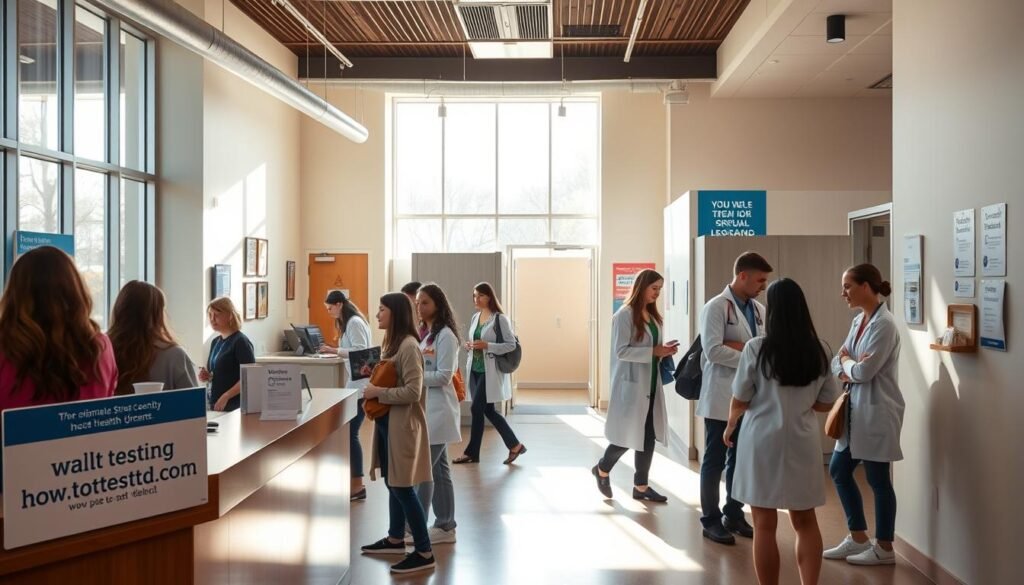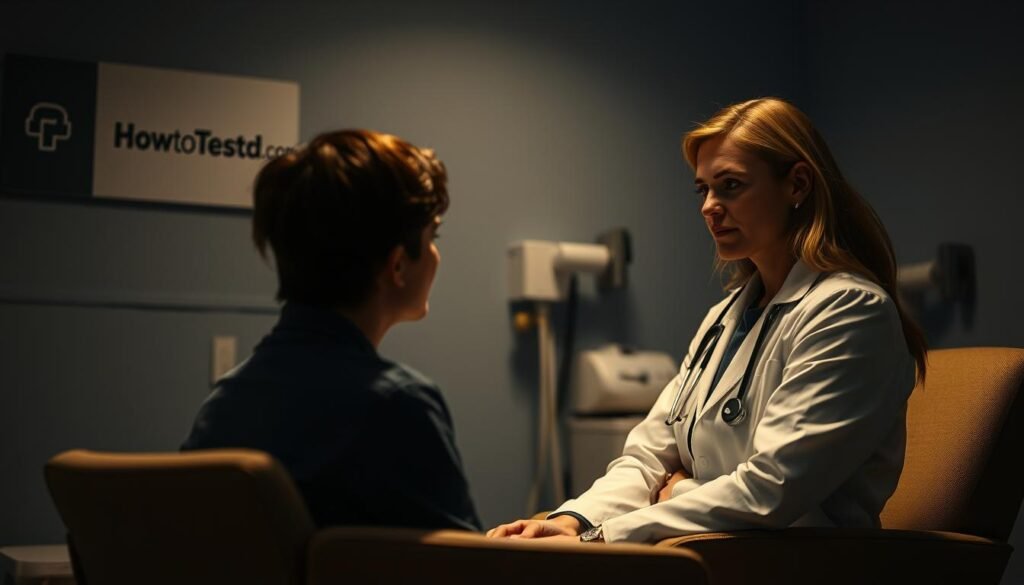College Students: Get Tested for STDs Today
Young adults between 18 and 24 are at a high risk of getting HIV and other STDs. This is what the Centers for Disease Control and Prevention (CDC) says.
Being sexually active is part of life on campus. But, it’s key to be careful about your health. Getting tested is a simple way to keep yourself safe.
Don’t wait to get tested. It’s important to know your health status. This helps you and your partners stay safe.
Key Takeaways
- Young adults aged 18-24 are at high risk for STDs.
- Getting tested is a key step in keeping your health safe.
- Being proactive about your health can really help.
- Knowing your status helps keep you and your partners safe.
- STD prevention is something we all need to do together.
The Rising Concern of STDs Among College Students
Sexually transmitted diseases (STDs) are a big worry for college students now. Young adults in college are more likely to get STDs. This is because they are more active sexually and don’t always know how to stay safe.
Current Statistics on STD Rates in College Populations
The Centers for Disease Control and Prevention (CDC) says young people, 18 to 24, are at high risk for STDs. College campuses are places where these infections spread. Chlamydia, gonorrhea, and syphilis are the most common STDs in college students.
| STD Type | Reported Cases Among Young Adults (18-24) | Percentage of Total Cases |
|---|---|---|
| Chlamydia | 1,300,000+ | 60% |
| Gonorrhea | 400,000+ | 35% |
| Syphilis | 50,000+ | 10% |
Why College Environments Increase STD Risk
College settings can make STDs more likely. This is because of more sexual activity, alcohol and drug use, and less access to sexual health info. Colleges need to offer good college health services, like sexually transmitted diseases screening and education.
Students can lower their STD risk by being proactive about their health. They should use university medical center testing and other resources. It’s important to take care of your health and get tested without delay.
Why Being Proactive About Sexual Health Matters
It’s very important to take care of your sexual health in college. Many students are away from home for the first time. They make choices about their health without guidance.
This freedom can lead to not knowing about STD risks. It’s also important to get tested regularly.
The Silent Nature of Many STDs
Many STDs don’t show symptoms. For example, chlamydia is common among college students but often has no signs. This makes it hard to know you’re infected unless you get tested.
“The majority of people with chlamydia are unaware they have it because they don’t have symptoms.”
Long-term Health Consequences of Untreated Infections
STDs can cause serious health problems if not treated. Untreated chlamydia can make women infertile. Gonorrhea can cause pelvic inflammatory disease.
| STD | Potential Long-term Health Consequences if Untreated |
|---|---|
| Chlamydia | Infertility, Pelvic Inflammatory Disease (PID) |
| Gonorrhea | PID, Increased risk of HIV infection |
| Syphilis | Organ damage, Increased risk of HIV infection |
Protecting Yourself and Your Partners
Getting tested regularly is key to protecting yourself and others. It helps prevent passing infections to others. Colleges offer confidential STI testing and student health clinic screenings.
By being proactive, you can lower STD risks. This helps make the campus a healthier place.
STD Testing for College Students: What You Need to Know
STD testing is very important for college students. It helps keep you healthy and stops diseases from spreading. If you’re sexually active, you’re more likely to get an STD.
Types of Tests Available
There are many STD tests out there. You can get:
- Urine tests for chlamydia and gonorrhea
- Blood tests for HIV, syphilis, and hepatitis
- Swab tests for chlamydia, gonorrhea, and herpes
How Often Should You Get Tested?
How often you should get tested depends on a few things. Like how often you have sex and with how many people. The CDC says if you’re under 25 and active, test for chlamydia and gonorrhea every year.
| Sexual Activity Level | Recommended Testing Frequency |
|---|---|
| Monogamous | Annually |
| Multiple Partners | Every 3-6 months |
Debunking Common Testing Myths
One myth is you only need to test if you have symptoms. But many STDs don’t show symptoms. So, it’s key to test regularly.
Don’t wait to get tested. Testing often is smart and keeps you safe. It helps stop diseases from spreading.
Common Barriers to Getting Tested and How to Overcome Them
Many college students don’t get tested for STDs. This is because of big obstacles. But, there are ways to beat these challenges.
Addressing Stigma and Embarrassment
Stigma is a big reason why students don’t get tested. They might feel too shy or ashamed. But, it’s key to know that STD testing is a smart move for your health.
Confidential STI testing helps by keeping things private. This makes students feel more at ease.
- Remember, getting tested is a smart and healthy choice.
- Talk to friends, family, or a counselor if you’re worried.
- Find college health services that promise privacy and confidentiality.
Managing Time Constraints
Students often say they’re too busy to get tested. But, many college health services have flexible hours. They also make testing quick.
- Plan your test for breaks or between classes.
- Find clinics that let you walk in or book online.
- Think about using at-home testing kits too.
Overcoming Financial Concerns
Money worries stop some students from getting tested. But, there are ways to make it cheaper.
- Look for free or cheap testing on campus or at local clinics.
- Check if your health insurance covers STD tests.
- Some groups offer money help or vouchers for tests.
By tackling these barriers, college students can get the STD testing they need. This helps keep them healthy.
Types of STDs College Students Should Be Aware Of
It’s important for college students to know about STDs. They can cause serious health problems if not treated. Knowing about STDs helps students stay safe.
Bacterial STDs (Chlamydia, Gonorrhea, Syphilis)
Bacterial STDs are caused by bacteria and can be treated with antibiotics. Chlamydia is common among college students. It can cause infertility if not treated.
Gonorrhea can lead to pelvic inflammatory disease. Syphilis is very infectious and can get worse if not treated.
Viral STDs (HIV, HPV, Herpes, Hepatitis)
Viral STDs are harder to treat because they are caused by viruses. HIV (Human Immunodeficiency Virus) weakens the immune system. There’s no cure for HIV.
HPV (Human Papillomavirus) can cause cervical cancer. Herpes causes sores. Hepatitis harms the liver and can cause serious problems.
Other Common Infections
College students should also know about trichomoniasis and hepatitis A. Trichomoniasis is a parasitic infection. Hepatitis A can spread through sex or contaminated food and water.
Knowing about STDs helps students protect their health. They can prevent infections by being informed.
Campus Resources for STD Testing
Campus resources for STD testing are getting better. This shows colleges want to help students stay healthy. They know it’s key to offer good health services.

University Health Services
Most colleges have a health service or medical center. They offer STD testing for things like chlamydia and gonorrhea. These services are easy and private, helping students get tested without worry.
Student Wellness Programs
Colleges also have wellness programs for students. These include health screenings and talks on sexual health. They offer help with STD testing, counseling, and support.
Peer Education and Support Groups
Peer groups are big in promoting sexual health. They’re led by students who know a lot about STDs. They help spread the word about testing.
How to Become a Peer Educator
To be a peer educator, students get special training. They learn about preventing and treating STDs. This helps them teach others well.
Benefits of Peer Support
Peer support groups are safe places to talk. Students can share worries and get help from friends. It’s great for those who are shy about health issues.
Off-Campus Testing Options for Students
Students looking for confidential STI testing have many off-campus choices. These places are easy to get to and often cheaper than school health services.
Community Health Clinics
Community health clinics give free or low-cost STD testing. They are great for college students. These clinics test for chlamydia, gonorrhea, and syphilis.
Planned Parenthood Services
Planned Parenthood is another good choice. They offer many sexual health services, like STD testing and treatment. Their clinics can handle many testing needs.
At-Home Testing Kits
At-home testing kits are getting more popular. They let students test for STDs privately at home.
Reliability and Accuracy
It’s important to use at-home testing kits right to get accurate results. Most kits are very good. But, results can change if you don’t follow the instructions well.
Step-by-Step Usage Guide
To use an at-home testing kit, do this:
- Read the instructions carefully before starting.
- Collect the required sample (urine, blood, or swab) as directed.
- Send the sample to the specified laboratory.
- Wait for your results, which are usually online or by phone.
Looking at these off-campus testing options helps students stay healthy. Whether it’s through clinics, Planned Parenthood, or at-home kits, confidential STI testing is easier than ever.
What to Expect During Your STD Testing Appointment
Getting tested for STDs is easy if you know what to expect. Knowing the steps can make you feel less anxious. It makes the experience smoother for college students.
Pre-Test Consultation
You’ll talk to a healthcare provider before the test. This is your chance to share your sexual health history. You can also talk about any worries you have and what tests you need.
Be open about your activities. This helps make sure you get the right tests.
Types of Samples Collected
Tests might need urine, blood, or swabs from different parts of your body. The healthcare provider will tell you how it works. They will make sure you’re okay with it.
Post-Test Follow-Up
After the test, you’ll get your results. This can be done privately online or by phone. If you have an STD, the provider will talk about treatment.
They will also help you tell your partners. Being ready and knowing what to expect makes STD testing easier. College students can handle their sexual health with confidence.
Confidentiality and Privacy Concerns
It’s important for students to know about privacy in STD testing. Keeping health info private is key, even more so for sensitive topics.
HIPAA Protections for Students
The Health Insurance Portability and Accountability Act (HIPAA) keeps health info safe. This law stops others from sharing STD test results without permission.
Anonymous and Confidential Testing Options
Many colleges offer secret STD tests. Anonymous testing hides who took the test. Confidential testing keeps the test private but linked to you.
| Testing Option | Description | Benefits |
|---|---|---|
| Anonymous Testing | Test results are not linked to personal identity | Maximum privacy, reduced risk of stigma |
| Confidential Testing | Test results are linked to personal records but protected by HIPAA | Accurate record-keeping, access to follow-up care |
Managing Testing Records on Student Health Portals
Colleges keep test records safe on health portals. These sites use strong security like encryption and safe logins.

Knowing about privacy helps students feel safe getting STD tests at college.
After the Test: Understanding Results and Next Steps
Getting tested for STDs is just the first step. Knowing how to understand your results is also key. It’s important to know what your test results mean, whether they are negative or positive.
Interpreting Negative Results
A negative test result means you likely don’t have the STD you were tested for. But, remember the window period for each STD. The window period is how long after exposure you can get a reliable test result.
For some STDs, this can be a few days. For others, it can be weeks or months. If you’ve been exposed recently, you might need to get retested after the window period.
What to Do If You Test Positive
If you test positive for an STD, don’t panic. Many STDs are treatable. The first step is to seek medical care from a healthcare provider or a sexual health clinic.
They can guide you on what to do next. This might include more tests to confirm the diagnosis and talk about treatment options. For some STDs, like chlamydia and gonorrhea, antibiotics can cure the infection.
For viral STDs like HIV, antiretroviral therapy (ART) can help manage the virus.
Treatment Options and Support Resources
Treatment for STDs depends on the type of infection. Bacterial infections are treated with antibiotics. Viral infections may need antiviral medications.
It’s also important to tell your sexual partners so they can get tested and treated if needed. Many colleges offer support resources. These include counseling services and peer support groups to help students cope with an STD diagnosis.
| STD Type | Common Treatment | Support Resources |
|---|---|---|
| Bacterial (Chlamydia, Gonorrhea) | Antibiotics | Counseling, Partner Notification Services |
| Viral (HIV, Herpes) | Antiviral Medications | Support Groups, Online Resources |
Understanding your STD test results and knowing what to do next is important for your sexual health. Whether your results are negative or positive, being informed and proactive is key to staying healthy.
Communicating with Partners About Testing
Talking openly with your partner about STD testing is key for a good relationship. It’s hard to start, but it’s very important. It helps keep trust and respect strong.
Starting the Conversation Before Intimacy
It’s important to talk about sexual health before being intimate. This talk helps you both know each other’s health status. It lets you make smart choices together.
Discussing Test Results
Sharing your STD test results with your partner is a big step. It helps build trust. It’s also a chance to talk about safety and what to do next.
Resources for Partner Notification
If you have an STD, telling your partners is very important. Many clinics help with this. They offer ways to tell your partners without revealing your identity.
| Resource | Description |
|---|---|
| Campus Health Services | Offers confidential STD testing and counseling |
| Planned Parenthood | Provides STD testing, treatment, and partner notification resources |
Conclusion: Don’t Delay, Get Tested Today
As a college student, taking care of your sexual health is key. Over one million new STI cases are reported every day. Many of these cases don’t show symptoms, making STD testing very important.
The Centers for Disease Control and Prevention (CDC) say you should get tested often. This is for common STDs like chlamydia, gonorrhea, and syphilis.
Getting tested is easy and private. Many clinics let you walk in and get tested right away. Private places can give you results in just 1-3 business days.
By getting tested, you protect your health and that of your partners. STD testing is a big part of staying healthy and safe in college.
Don’t wait until it’s too late. If you’re active, never tested before, or feel sick, get tested today. Taking steps to prevent STDs means a healthier future for you and others.
FAQ
What are the risks of not getting tested for STDs as a college student?
Not testing for STDs can cause serious health problems. These include infertility, certain cancers, and a higher risk of HIV. Many STDs don’t show symptoms, so it’s key to get tested often.
How often should I get tested for STDs?
How often you should test for STDs depends on a few things. These include how active you are sexually, how many partners you have, and if you or your partners have been tested before. Usually, students should test at least once a year. But, if you have many partners, you might need to test more often.
What types of STD tests are available?
There are many STD tests out there. These include urine tests, blood tests, and swab tests. The type of test you need depends on the STD, your symptoms, and your risk factors.
Are STD tests confidential?
Yes, STD tests are kept private. Health services at universities and community clinics follow HIPAA rules. This means your test results are safe.
Can I get tested for STDs at my college or university?
Yes, many schools offer STD testing. You can find these services at health centers or student wellness programs. These services are often private and might be free or cheap.
What if I test positive for an STD?
If you test positive for an STD, you’ll get help and support. Many STDs can be treated with antibiotics. Others need ongoing care. Your doctor will help you figure out what to do next.
How do I talk to my partner about getting tested for STDs?
Talking about STD testing with your partner can be tough. But it’s important for a healthy relationship. Start early, be open, and talk about your results together.
Are at-home STD testing kits reliable?
At-home STD testing kits can be good if they’re from trusted makers and used right. But, it’s important to see a doctor to confirm the results and get treatment if needed.
How can I overcome the stigma associated with STD testing?
To beat the stigma of STD testing, learn more about it. Knowing that STDs are common and testing is smart can help. It shows you care about your health.
What are the benefits of getting tested for STDs regularly?
Testing for STDs regularly keeps you healthy. It stops infections from spreading and helps create a safe, responsible community.


